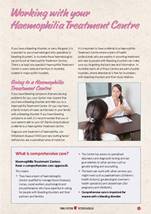Working with your Haemophilia Treatment Centre
If you have a bleeding disorder, or carry the gene, it is important to see a haematologist who specialises in bleeding disorders. In Australia these haematologists can be found at Haemophilia Treatment Centres There is at least one specialist Haemophilia Treatment Centre in every state and territory in Australia, located in major public hospitals.
Haemophilia Treatment Centres have a comprehensive care approach. This means:
- They have a team of haematologists (doctor qualified to manage blood diseases), nurses, social workers, psychologists and physiotherapists who have expertise in caring for people with bleeding disorders and their partners and families.
- The Centre has access to specialised laboratory and diagnostic testing and can give referrals to other services such as genetic testing and counselling.
- The team can work with other services you might need such as paediatricians (children’s health doctors), gynaecologists (women’s health specialists) and obstetricians (for pregnancy and childbirth).
- Comprehensive care is important for anyone with a bleeding disorder.
Going to a Haemophilia Treatment Centre (HTC)
If you have bleeding symptoms that are causing problems for you, your doctor may suspect that you have a bleeding disorder and refer you to a Haemophilia Treatment Centre. Or you may have a family history of males and females in your family with a bleeding disorder. If you have bleeding symptoms as well, it is recommended that you or your parents talk to your GP (family doctor) about a referral to a Haemophilia Treatment Centre.
If you are 16 years or older you can attend the Haemophilia Treatment Centre on your own but often it is useful to bring along a support person such as a parent, or other family member. This decision will depend on factors such as your ability to understand your condition, and whether you feel confident to ask questions and make decisions about your own health care. You might simply like some support during your appointment. You can always call the Haemophilia Treatment Centre first to discuss whether to come in on your own or with support.
Your medical team
Ideally all your doctors should work together on planning your health care. The team could include:
- A haematologist (doctor qualified to manage blood diseases) and who specialises in bleeding disorders.
- A gynaecologist (women’s health specialist)
- A general practitioner (your GP or family doctor)
- A paediatrician (children’s health specialist)
- An obstetrician (pregnancy and childbirth specialist) when this is relevant to you or your family situation.
Your regular GP is important for looking after aspects of your health that may not be associated with your bleeding symptoms and to recognise when it’s time to involve the Haemophilia Treatment Centre.
More information
Contact details of Haemophilia Treatment Centres in Australia are available on the HFA website.

If you’d like to know more about going to a Haemophilia Treatment Centre our Female Factors – Working with your HTC resource here. It contains more information on visiting your HTC including:
- Going to a Haemophilia Treatment Centre
- What is comprehensive care?
- Your medical team

For more information on bleeding disorders in young women read our full Female Factors resource here